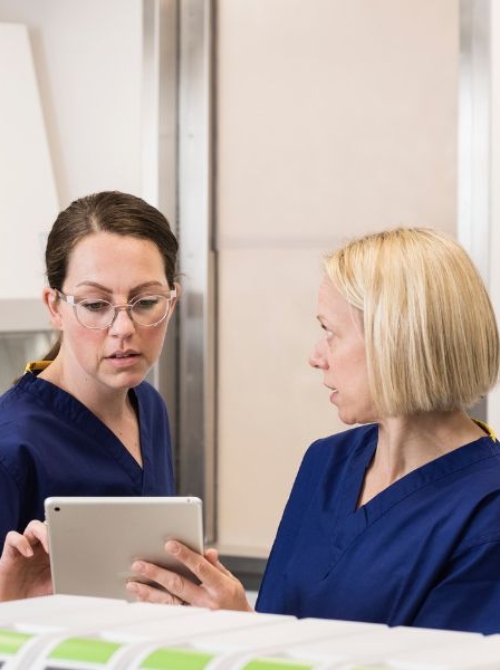When IVF doesn’t work: what happens next.
A failed IVF cycle can feel overwhelming – emotionally, physically and mentally. It’s not just a clinical outcome, but the loss of something deeply hoped for. This blog, written by our medical and embryology directors, gently outlines what to consider after an unsuccessful IVF cycle, including possible reasons and supportive next steps from both perspectives.
By Mr Ed Coats and Emma Whitney
At The Evewell, we know that a failed IVF cycle is more than just a clinical result. It is an emotional, physical and deeply personal experience. For many, it is the loss of something hoped for, longed for and worked hard for.
In this blog, we want to gently guide you through what to do when IVF does not go as planned, from both the clinical and embryology perspectives, while acknowledging that every journey is unique.
We hope that you do not need to refer back to this, but if you do, please know: you are not alone, and there are compassionate, informed steps forward.
Part 1: The clinical view
By Dr Ed Coats, Medical Director
When an IVF cycle does not lead to a positive pregnancy test, the first thing we want you to know is this: it is not your fault.
This journey requires extraordinary resilience, and a failed cycle can feel devastating. Many people blame themselves, but fertility is complex. The reasons for IVF failure are rarely due to anything you did or did not do. One of the most important things we can say is this: be kind to yourself.
Clinically, a failed cycle can offer important insights. We start by reviewing every stage, from stimulation to embryo transfer.
We examine:
- Endometrial receptivity
- Was the lining thick enough? Did it respond well to medication?
- Hormone levels
- Were oestrogen and progesterone levels within optimal ranges? Was thyroid function normal?
- Uterine health
- Are there fibroids, polyps or endometriosis that may impact implantation?
- The uterine microbiome
- Is the bacterial environment inside the uterus balanced?
- Lifestyle factors
- Is weight, stress, or general health affecting outcomes?
- Protocol matching
- Would a natural FET or medicated cycle suit your body better?
We also review any relevant history, such as autoimmune conditions or blood clotting disorders, that may impact embryo implantation.
A key consideration is continuity of care. Being supported by the same doctor and nursing team matters – emotionally and clinically. Our team works together to review each case, and after every unsuccessful cycle, we hold a multidisciplinary team (MDT) meeting to examine what happened and what could be improved.
One of the hardest – yet bravest – things a patient can do is return to treatment after a failed cycle. Walking back into a clinic after a loss is an act of hope, and we will meet you there with compassion and clarity.
Part 2: The embryology and genetics view
By Emma Whitney, Director of Embryology and Genetics
From the embryology perspective, failure can occur long before a pregnancy test. Sometimes, we do not reach fertilisation. Other times, embryos stop developing before transfer. These moments can feel especially confusing and painful, particularly when no embryos are available to transfer or freeze.
When IVF does not work, we ask many questions:
- Embryo quality
- What grade were the embryos? Were they euploid (chromosomally normal)?
- Development timing
- Did the embryo reach the blastocyst stage on Day 5 or 6? Later blastocysts often have lower implantation rates.
- Growth patterns
- Did the embryo divide consistently? Our time-lapse incubators allow us to monitor development minute-by-minute, watch how the embryo develops and only select embryos we think will give you the best chance of success.
- Fertilisation failure
- Was the issue at the egg-sperm interaction stage? Sometimes, no embryos are formed at all.
- Sperm quality
- Were there issues with DNA fragmentation or sperm ageing?
- Freezing and thawing
- Did the embryo re-expand after thawing?
We also now place growing importance on the embryo transfer itself. Was it a smooth procedure or more difficult? Was the embryo placed in the ideal position? These clinical details are all part of the bigger picture.
PGT-A (pre-implantation genetic testing for aneuploidy) can also be a helpful tool. This involves testing embryos for chromosomal abnormalities before transfer, which can increase the likelihood of success by selecting a euploid embryo. While PGT-A is not suitable for everyone, it can be a valuable part of the puzzle, particularly in cases of recurrent implantation failure or known genetic conditions.
However, even when a genetically normal (euploid) embryo is transferred, success is not guaranteed, and this can be one of the most emotionally difficult outcomes to process. A euploid embryo may not implant for reasons beyond the embryo itself. These may include issues with endometrial receptivity, immune factors, uterine abnormalities, or the timing of the transfer in relation to hormone levels. Sometimes, the reason may remain unexplained, and we know how hard that uncertainty can be.
No matter the outcome, our embryologists, nurses and doctors work together to reflect and refine. Our goal is always to improve your chances – and to support you fully while doing so.
A final word
A failed cycle does not mean a failed future. Sometimes, it simply means we need to learn more – about your body, your embryos and how they interact.
If you are wondering what happens next, or how to prepare for another cycle, we are here to help you make sense of it. Every journey is different, and success is not always linear.
Please know: this is hard. But you are not alone. And there are next steps. Let us help you take them, when you are ready.


